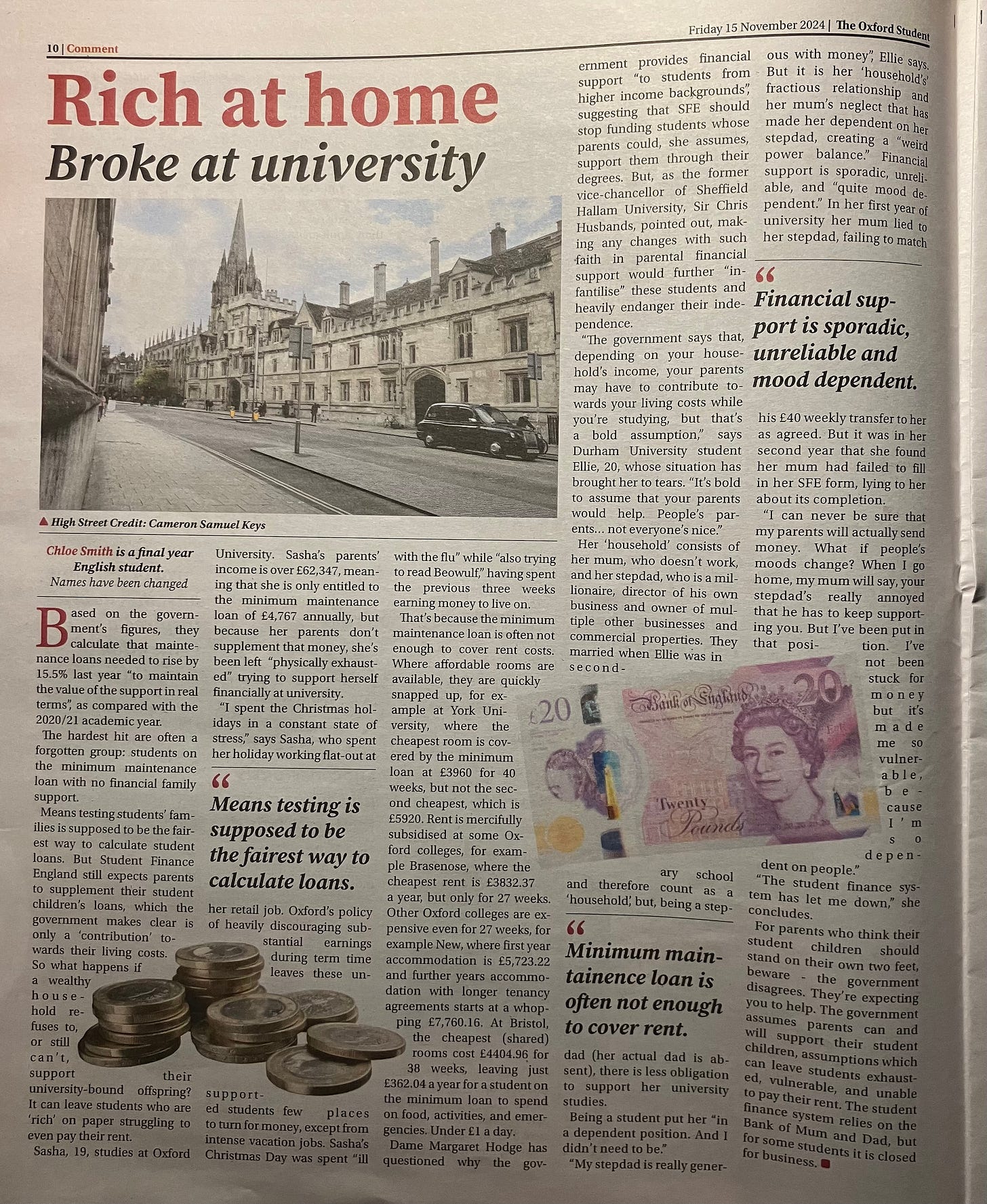Rich at Home, Broke at University
Published in The Oxford Student 15.11.2024 and online as 'Inadequate maintenance loan rise hurts unsupported students on minimum loan'.
The rich get richer, or so they say. But for some students, their families’ wealth is only making them poorer at university.
The government has announced a 3.1% rise in maintenance loans for students for the 2025-26 academic year, equivalent to the rise in tuition fees. For students studying at Oxford this is a £317 increase to the maximum maintenance; for students in London, it is a £414 rise. The government states that the 3.1% rise is an increase in line with inflation, yet the maximum £414 extra fails to uplift student maintenance loans in real terms, leaving students struggling more than ever.
Money Saving Expert calculates that the 2024-25 uplift of 2.5% in maintenance loans fell “well short” of the actual 4% inflation rate, creating a “real-terms cut” for students. Based on the government’s figures, they calculate that maintenance loans needed to rise by 15.5% last year “to maintain the value of the support in real terms”, as compared with the 2020/21 academic year.
The hardest hit are often a forgotten group: students on the minimum maintenance loan with no financial family support.
Means testing students’ families is supposed to be the fairest way to calculate student loans. But Student Finance England still expects parents to supplement their student children’s loans, which the government makes clear is only a ‘contribution’ towards their living costs. So what happens if a wealthy household refuses to, or still can’t, support their university-bound offspring? It can leave students who are ‘rich’ on paper struggling to even pay their rent.
Sasha, 19, studies at Oxford University. Sasha’s parents’ income is over £62,347, meaning that she is only entitled to the minimum maintenance loan of £4,767 annually, but because her parents don’t supplement that money, she’s been left “physically exhausted” trying to support herself financially at university.
“I spent the Christmas holidays in a constant state of stress,” says Sasha, who spent her holiday working flat-out at her retail job. Oxford’s policy of heavily discouraging substantial earnings during term time leaves these unsupported students few places to turn for money, except from intense vacation jobs. Sasha’s Christmas Day was spent “ill with the flu” while “also trying to read Beowulf,” having spent the previous three weeks earning money to live on.
That’s because the minimum maintenance loan is often not enough to cover rent costs. Where affordable rooms are available, they are quickly snapped up, for example at York University, where the cheapest room is covered by the minimum loan at £3960 for 40 weeks, but not the second cheapest, which is £5920. Rent is mercifully subsidised at some Oxford colleges, for example Brasenose, where the cheapest rent is £3832.37 a year, but only for 27 weeks. Other Oxford colleges are expensive even for 27 weeks, for example New, where first year accommodation is £5,723.22 and further years accommodation with longer tenancy agreements starts at a whopping £7,760.16. At Bristol, the cheapest (shared) rooms cost £4404.96 for 38 weeks, leaving just £362.04 a year for a student on the minimum loan to spend on food, activities, and emergencies. Under £1 a day.
Dame Margaret Hodge has questioned why the government provides financial support “to students from higher income backgrounds”, suggesting that SFE should stop funding students whose parents could, she assumes, support them through their degrees. But, as the former vice-chancellor of Sheffield Hallam University, Sir Chris Husbands, pointed out, making any changes with such faith in parental financial support would further “infantilise” these students and heavily endanger their independence.
“The government says that, depending on your household’s income, your parents may have to contribute towards your living costs while you’re studying, but that’s a bold assumption,” says Durham University student Ellie, 20, whose situation has brought her to tears. “It's bold to assume that your parents would help. People's parents… not everyone’s nice.”
Her ‘household’ consists of her mum, who doesn’t work, and her stepdad, who is a millionaire, director of his own business and owner of multiple other businesses and commercial properties. They married when Ellie was in secondary school and therefore count as a ‘household’, but, being a stepdad (her actual dad is absent), there is less obligation to support her university studies.
Being a student put her “in a dependent position. And I didn’t need to be.”
“My stepdad is really generous with money”, Ellie says. But it is her ‘household’s’ fractious relationship and her mum’s neglect that has made her dependent on her stepdad, creating a “weird power balance.” Financial support is sporadic, unreliable, and “quite mood dependent.” In her first year of university her mum lied to her stepdad, failing to match his £40 weekly transfer to her as agreed. But it was in her second year that she found her mum had failed to fill in her SFE form, lying to her about its completion.
“I can never be sure that my parents will actually send money. What if people's moods change? When I go home, my mum will say, your stepdad’s really annoyed that he has to keep supporting you. But I've been put in that position. I’ve not been stuck for money but it’s made me so vulnerable, because I’m so dependent on people.”
“The student finance system has let me down,” she concludes.
Middle-income families don’t always have money spare to support their children at university, even if they want to. Perhaps means testing thresholds are too low. The Student Finance England means testing system is based on household income. If a student’s household income is over £62,347, they receive the minimum maintenance loan, which is £4,767 annually. Average household earnings do not far outstrip the threshold, which also fails to account for other dependents, such as siblings. The average annual household income of a full time working heterosexual couple between ages 50 and 59 is £84,396 (Forbes), entitling their child to the minimum loan.
“In an ideal world,” Sasha concludes, there would be “some way to anticipate that, even if the parents have money, it might not actually be going to the students.” Sasha suggests that SFE should ask how many siblings the household income is split between. Or, as Ellie says, the government could give every student the same, allowing forgotten middle students an equal chance.
For parents who think their student children should stand on their own two feet, beware - the government disagrees. They’re expecting you to help. The government assumes parents can and will support their student children, assumptions which can leave students exhausted, vulnerable, and unable to pay their rent. The student finance system relies on the Bank of Mum and Dad, but for some students it is closed for business.





